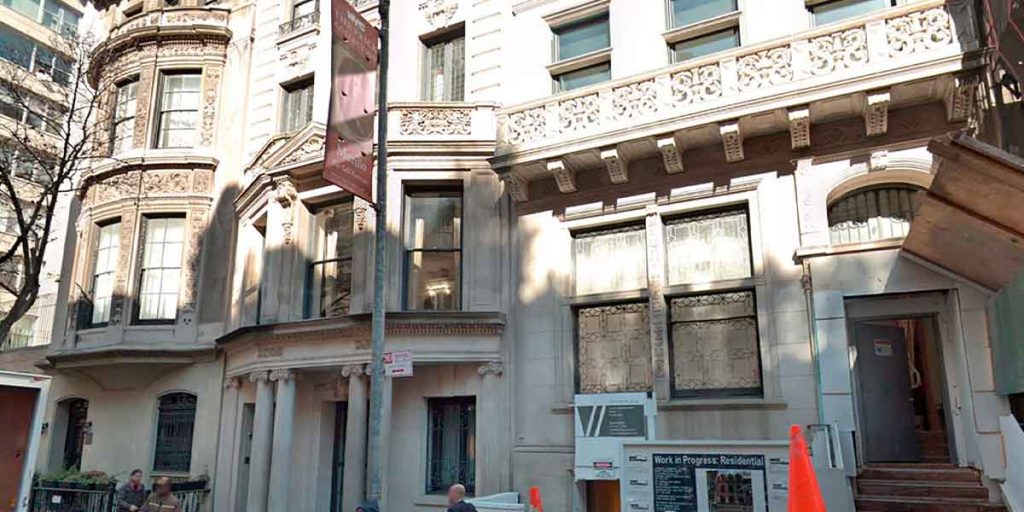Annabella Murphy the widow of hedge funder Charles Murphy, who jumped to his death last year has sold their Upper East Side mansion for $28.5 million. That’s well below its peak $49.5 million asking price from 2016, reports the Real Deal. Charles Murphy snagged the 11,550-square-foot spread for $33 million in 2007 from Seagram heir Matthew Bronfman. That wasn’t long after he joined Fairfield Greenwich, a hedge fund that invested about half of its assets, a mighty $7 billion with Bernie Madoff. But in 2008, Murphy lost some $50 million to Madoff’s Ponzi scheme. Last March, the 56-year-old, dressed in a suit, leapt from the 24th floor of Midtown’s luxury Sofitel New York hotel.
Just three weeks before his death, he added Annabella to the deed of their mansion. The move gave her apparent sole ownership of the property, and suggests he may have been planning his grim death for some time. “It would appear that by putting her on the deed, he gave her an equal and undivided interest in the property so that she would have owned 100 percent at the time of his death,” Jules Haas, a New York City estate planning attorney, told The Post in 2017. The home purchase, which was recorded Wednesday in city records, was made by an entity named 7E67D LLC; located between Fifth and Madison avenues, the 25-foot-wide townhouse has a Beaux Arts-style limestone facade, 11 fireplaces, parlor-floor ceilings nearly 13 feet high and three outdoor areas.
Beyond seven bedrooms, seven full bathrooms and three powder rooms, there’s also a stately wood-paneled library, a big kitchen and an elevator.
Annabella Murphy sold the house for $28.5 million to an anonymous LLC earlier this year. She is suing Metrikin for unspecified damages, including funeral, burial costs and her husband’s “conscious pain and suffering” leading up to his death. Murphy’s Fairfield Greenwich Group invested more than $7 billion with Madoff and eventually agreed to pay $125 million to settle a lawsuit related to the 2008 Madoff-Ponzi scheme case. After Fairfield, Murphy worked for New York-based Paulson. According to media reports, Murphy also worked with Morgan Stanley, Deutsche Bank and Credit Suisse. He is considered the fourth person connected to the Madoff case to commit suicide. Madoff himself is serving a 150-year prison sentence. His son Mark hanged himself in 2010. Two other investors William Foxton and René-Thierry Magon de La Villehuchet, ended their lives after losing vast sums to the scheme.
Estate Planning for Real Estate owners
Real estate owners are prime estate planning candidates. Without proper planning, an owner’s family can be left to pay significant estate tax without liquid assets to make the payment. Even though that tax can often be paid over a 14-year period, the cash flow needed to make those tax payments can significantly reduce cash available to provide for the family. Also, real estate owners often spend much of their careers accumulating prime real estate assets that are irreplaceable. If such assets need to be sold to pay estate tax, the owner’s efforts in putting together a prime real estate portfolio are lost. With proper estate planning, however, those assets can be maintained for future generations.
The Tax Rules
Everyone is taxed on what they own when they die. There are only two ways to reduce that tax; own less, or make what you own worth less. Real estate owners are uniquely situated to do both. Under current law, everyone can give away (or die owning) $11,580,000 of assets without incurring gift (or estate) tax. A married couple can give away twice that amount, or $23,160,000. That amount, the exemption amount, is scheduled to be cut in half in 2026. And as local and federal governments struggle with significant budget shortfalls as a result of the pandemic and record unemployment, there may be pressure and proposals to quickly cut the gift and estate tax exemption in 2021 after the 2020 national elections. Therefore, taxpayers may be wise to “use or lose” that bigger exemption amount as soon as they can. Though there was initial concern, the IRS has already said that use of the bigger exemption amount now will not be “clawed back” later.
It’s always better to make gifts when assets are at the “low end” of their values, rather than at the “high end”. In essence, if a real estate owner had a property worth $15,000,000 that is now worth $11,580,000, he could give the entire property away within the amount of his or her exemption amount. On the other hand, if the gift was made when the property was worth $15,000,000, the $3,420,000 in excess of the exemption amount would be taxed at 40%. In this example, if the gift is made at the high end, $1,368,000 of gift tax would be due.









